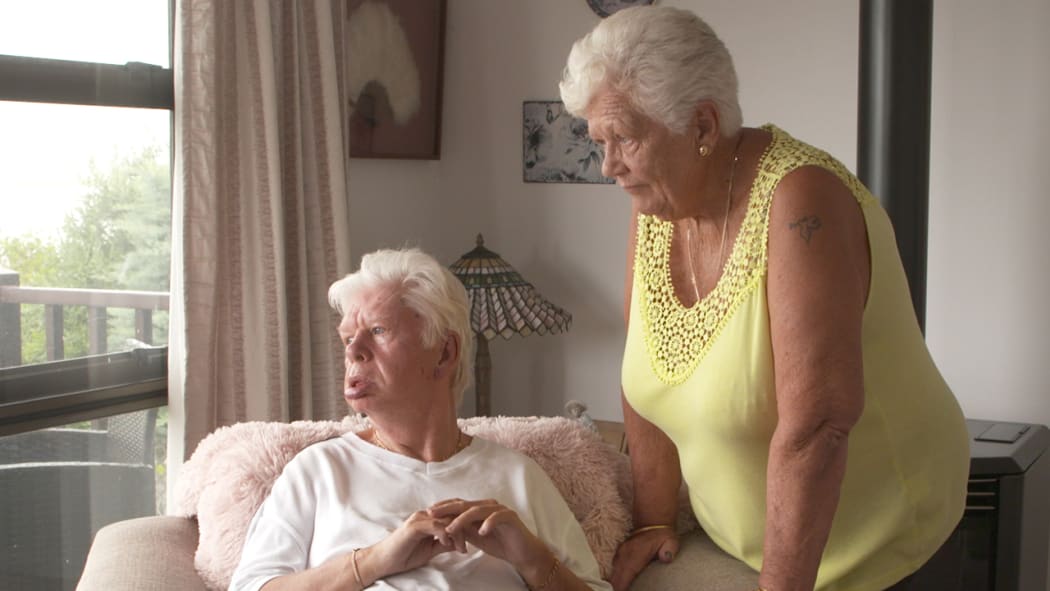An elderly Auckland mother is taking her severely disabled son to court for failing to be a good employer.

Diane Moody, 76, cares for her son Shane Chamberlain full-time Photo: RNZ / Screenshot
Diane Moody wants the Employment Court to declare her son Shane Chamberlain isn't capable of employing her.
She said she was reluctant to go to court, but she had no choice because it was the only way to change the system so that she and other families caring for their adult disabled children could be paid fairly.
Diane Moody, 76, cares for her profoundly intellectually disabled son in their home, and she's paid for 21 hours a week at the minimum wage through the Ministry of Health's Funded Family Care scheme.
Under that arrangement her 51-year-old son, who has the mental age of a two-year-old, is deemed to be her employer.
"Shane's not going to be able to do the tax or the ACC or say to me, 'You are my employee so I would like you to do, blah, blah, blah', he's just simply not capable of doing anything like that," she said.
To illustrate her son's lack of comprehension, she said when she raised the prospect of a court case, he asked her what was for dinner.
She said the Ministry of Health knew the employment relationship was a farce and even admitted as much in the Court of Appeal earlier this year, agreeing the relationship was a "mere fiction" and conceding many people with disabilities were so impaired they did not have the mental capacity to employ another person.
"[On] one hand they say, 'Shane and his friends lack the mental capacity to be able to do these things'. But then all of a sudden if it is convenient for them, 'Just let them be the employer, just fill out the forms it will be all right, we know it's illegal and it shouldn't be, but just fill out the forms'," she said.
Shane's advocate, Jane Carrigan said the lack of action since the Court of Appeal case had forced their hand.
"Seven months, all the fake promises issued by the minister and his ministry, nothing has happened. And nothing in all of our dialogue with the Crown and the Ministry has given us any confidence that anything is going to change. In fact reading the documents and the cabinet papers I suspect they are going to try and hold off until the end of 2020," Ms Carrigan said.
The Employment Court action doesn't yet name the Ministry of Health as a party, but Ms Carrigan said that would probably happen when the case began.
She said if the ministry was found to be the employer there would be ramifications as family carers were currently paid the minimum wage, rather than the equal pay rate.
"There are also other things around holiday pay [and] sick leave. You can't tell me the Ministry of Health have not known this all along, they simply have but they just believe they can get away with stuff so they completely ignore court directions, their own concessions in court and they just go off on their own merry frolic, is the only way to describe it" she said.
Mrs Moody first took the case to the Employment Relations Authority, which has referred it up to the Employment Court for a decision.
The Authority said the case had implications for the 354 families who were currently receiving funded family care, as well as the other funding arrangements the ministry had for people caring for the severely disabled.
It suggested trade unions might want to be involved in the case on the wider policy and employment issues.
The Public Service Association said it has had discussions with Etū and the Council of Trade Unions and the three had agreed to be involved, it was just a question of how.
PSA assistant secretary Kerry Davies said the disabled person who was supposedly the employer had no control over the pay rates, hours or conditions, which were set by the Ministry of Health.
"It looks like it's a bit of a device that's been set up to blur responsibilities and in fact shift responsibilities from the actual employer and the funder to people who don't in fact have any control over the core elements of what an employment relationship should involve," Ms Davies said.
Mrs Moody said she would like to see the Health Minister David Clark get involved directly.
"Maybe he'd like to have a cuppa tea and meet Shane and then perhaps he's never actually met these people to realise that they can't be an employer. He's very welcome to come to my home. He's not likely to because he never replies to anybody. But I think they've just got to be realistic about the whole thing, which they're not," she said.
A date is yet to be set for the hearing.





